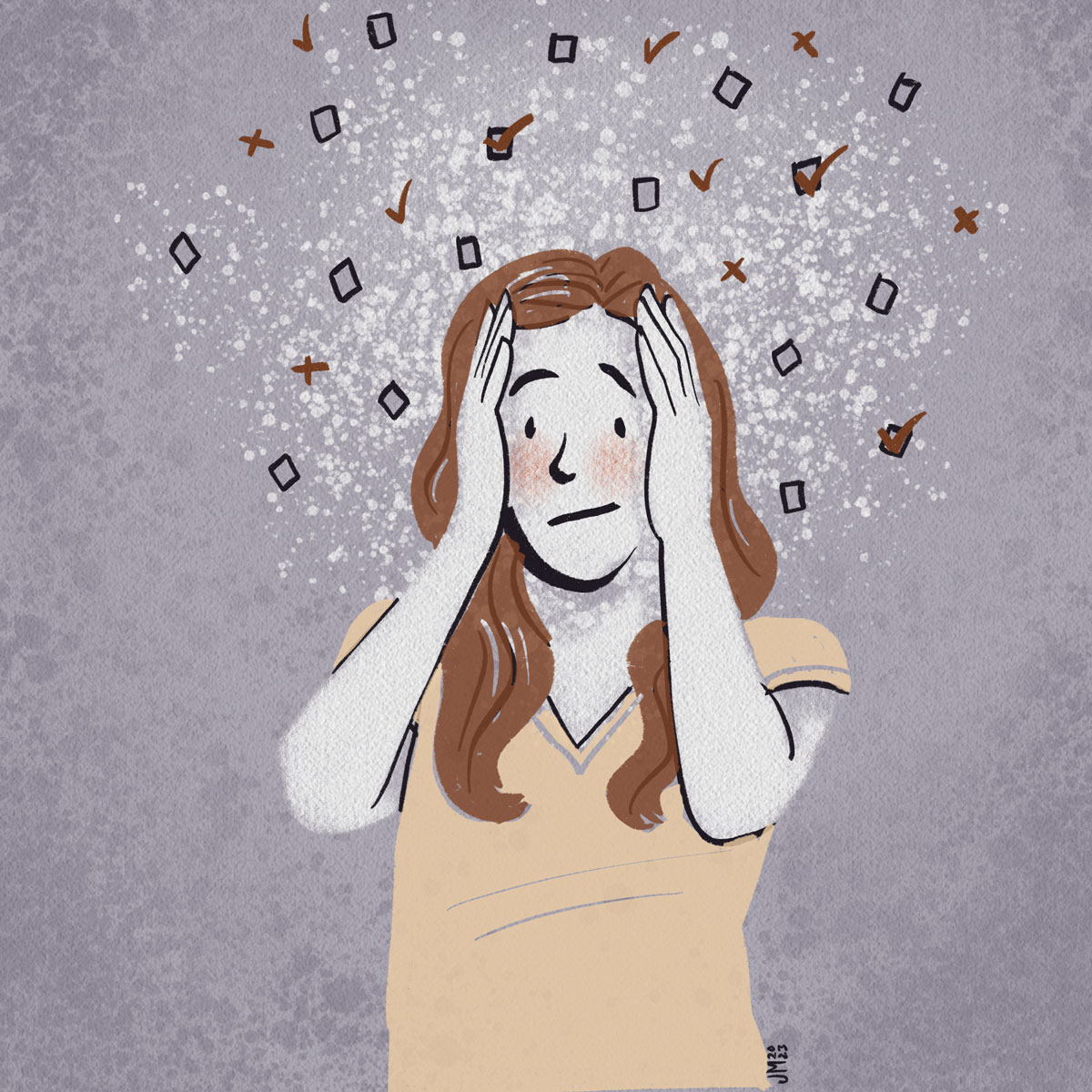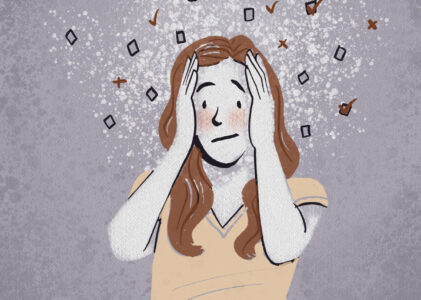You’ve got so many things to do that you can’t do a single one of them—that’s how it feels to have ADHD paralysis.
Most of us feel overwhelmed by choices, tasks and responsibilities from time to time.
We might not want to clean out the fridge, organize the pile of papers on our desk, or finish up a project for work, but we do it.
We might hesitate when deciding what brand of speakers to buy, where to go on vacation or which cleaning solution is least toxic, but we figure it out.
However, if you have ADHD, choices and responsibilities may cause such frequent and debilitating distress that you can’t seem to get anything done.
To the outside world, it may look like you’re just sitting there, doing nothing. People might assume that you’re being lazy or procrastinating. They might feel angry or frustrated with you and say things like, “Come on! Why can’t you just do it already?!”
What they can’t see is the turmoil whirling inside your head. You feel trapped by your own thoughts—overwhelmed, confused, and unable to act. You don’t know where to start, everything seems equally important, and you feel angry with yourself for wasting so much time.
ADHD paralysis feels terrible! Fortunately, you can take steps to manage and prevent it.
Read on to learn more about ADHD paralysis—what it is, why it happens and what you can do to break out of it.

What is ADHD paralysis?
ADHD paralysis isn’t a diagnosis or a diagnostic symptom of ADHD. Rather, it’s a state that many people with ADHD experience because of the way their brains work.
ADHD is a neurobiological disorder associated with impaired executive functioning and dopamine imbalances in the brain. These issues make it harder for people with ADHD to focus, process information, make choices, plan, prioritize, and work toward goals [1, 2, 3].
ADHD paralysis happens when a person with ADHD feels overwhelmed by their environment or the amount of information they’re receiving. They freeze and can’t think or function effectively. This is further complicated by the relationship between dopamine levels and motivation.
For people without ADHD, stable dopamine levels allow them to muster enough motivation to tackle mundane tasks because they can anticipate a future reward (like having clean laundry).
Unfortunately, in ADHD brains, there’s not enough dopamine to transform future rewards into present motivation. So, if an activity isn’t rewarding in and of itself (like video games, hobbies, socializing), it’s hard to motivate yourself to do it.
If you experience ADHD paralysis, you may identify with some or all of these issues:
- Tending to overanalyze or overthink problems or situations
- Feeling unable to start a project
- Difficulty prioritizing and managing tasks
- Trouble making decisions
- Jumping from one task to another
- Losing your train of thought
- Experiencing brain fog or a lack of clarity
- Time blindness (losing track of time), having trouble managing time
- Difficulty maintaining focus, being easily distracted
Fortunately, there are steps you can take to organize your goals, plan your attack and build your motivation.
8 tips to alleviate ADHD paralysis
Different tasks and situations will likely require different strategies. Here are some techniques for you to try.
Break it down
Write down what you need to accomplish. Which task is most important? What are the steps required to finish it? What can you do right now?
Set a timer for 10 minutes and tackle one aspect of the task. For example, if your overall goal is to clean your house, you might spend 10 minutes picking up trash. Once you’re in the groove, you’ll probably end up doing even more than that, but don’t focus on that now.
Combine activities
Can you knock out two boring activities at once? For example, while you’re waiting for the oven to preheat, can you empty the dishwasher?
Alternatively, is there a fun activity you can combine with a mundane one? Like folding clothes while watching a favorite show?
The next time you find yourself slumped on the couch, unsure of where to start, get some paper and make a game of pairing boring activities. How many tasks can you cross off your list this way?
Use a whiteboard
Grab a planner and a whiteboard and plan out your goals. The physical act of writing them down will help you organize your thoughts and plan your attack. Seeing visual reminders of your goals, and the progress you make on them, will build motivation and help you stick to your plan.
Set a designated time
If your schedule allows, it may help to set aside the same time each day to tackle a few tasks on your list. Don’t worry about finishing them—just getting started is a major feat in and of itself!
Focus on good enough
Forget perfect. Getting something done is far more important than perfecting the details. Take a moment to assess what’s good enough for now and work toward that goal.
Cross it off your list
Seeing a checkmark next to a task is a powerful reward! It may increase your motivation to cross even more tasks off your list.
Follow your whims
Sometimes, you might set out to do one task but feel pulled in another direction (your partner or friends have probably noticed this tendency!). You decide to organize the garage but end up cleaning out the fridge. If you’ve got time and both things need to get done, it’s okay to go with your flow. It’s often more important to get stuff done than to stick to a list.
Who knows, maybe you’ll organize the garage after you decide to wash your car?
Make it fun
Put on music, turn it into a game, challenge a friend or find some other way to make a tedious task more enjoyable.
Next Steps
We hope these tips help you get started on a task you’d like to accomplish, no matter how big or small. You can do it!
If you struggle with ADHD symptoms to the point that you have trouble functioning at work, school, or other important areas of your life, you might benefit from talking to a professional.
If you or someone you love struggles with symptoms of ADHD, call your doctor or contact Athena Care, for mental health care in Tennessee.
One of our Care Coordinators will help you get the care you need.

Rachel Swan, MS
Editor
Rachel has a Masters of Science in Clinical Psychology from Vanderbilt University, where she spent 16 years as a Research Analyst in the Psychology and Human Development Department.


